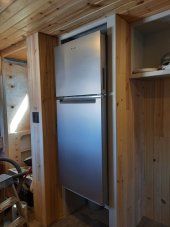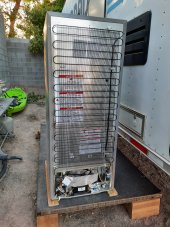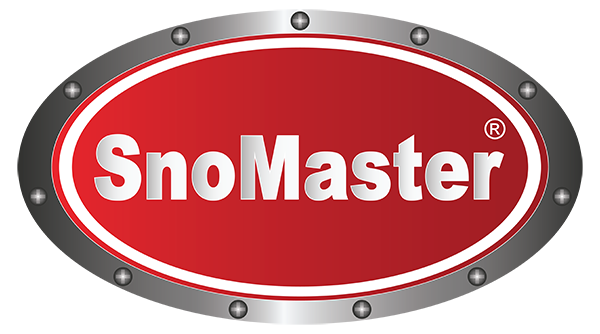Lt.Dan
Solar Wizard
Just checked. 135watts running. Old fridge was 600watts running. Win-win-win.
that is so cool... also the it will run about 30% as much every day. and you have ICE lolJust checked. 135watts running. Old fridge was 600watts running. Win-win-win.
Welp, I kicked off my personal testing this afternoon. Consumption is about what I expected.
I didn't kill off my phantom loads (tvs, whatever) so I'm using a steady 421w right now through my inverter.
My DC load is around 100w, since I forgot and left my vent fan on (it was hot down there today).
Figuring I stay around 500w tonight, I'll use about 6kw of juice overnight. Probably less since we are seeing the sun early. It's cloudy now so I'm down to a couple hundred watts of solar.
I see a couple options I can go with IF I decide to optimize.
1) JC conversion kit, with shipping is friggin 1400/1300 DC vs AC.
2) Something like this furrion: https://www.etrailer.com/RV-Refrigerators/Furrion/FCR14ACBQASS.html (Black is cheaper)
There are other RV specific units.... Dang now I'm intrigued.
The JC conversion leaves you with the same small interior space (except for the space you gain from removing the inside cooling fins. It also uses more electricity than other options. Based on this I decided to buy the Everchill 11cu ft model. It is nearly 6 inches taller than my existing 6 cu ft fridge, but gives me nearly 2x the interior room.That furrion is just about the same price as the JC conversion kit. But there is no such thing as free shipping so it is probably a $1,400 refer. I'd go with whichever has the best compressor and insulation. It sounds like JC would have the upper hand in customer service though.
I didn't like the JC conversion because it forced me to keep the same poor fridge space as well. My new fridge fits in the same place, but because it doesn't have all the evaporative equipment on the back, the fridge could be 3-4" deeper, and then I also was able to move it closer to the back wall because airflow was not as critical to the new fridge, allowing me even more depth.The JC conversion leaves you with the same small interior space (except for the space you gain from removing the inside cooling fins. It also uses more electricity than other options. Based on this I decided to buy the Everchill 11cu ft model. It is nearly 6 inches taller than my existing 6 cu ft fridge, but gives me nearly 2x the interior room.
I don't have any personal experience with the Everchill fridge so I can't comment on longevity, etc. But, the reviews I've seen are glowing and once cooled, it draws 30 watts on average. I can't fit a residential fridge or I would definitely consider it.
I didn't like the JC conversion because it forced me to keep the same poor fridge space as well. My new fridge fits in the same place, but because it doesn't have all the evaporative equipment on the back, the fridge could be 3-4" deeper, and then I also was able to move it closer to the back wall because airflow was not as critical to the new fridge, allowing me even more depth.
I went from an 18cu ft to a 21cu ft fridge and It feels like it doubled in size!
Also, have you looked at smaller residential refrigerators? I saw some pretty small ones, from dorm fridges all the way up to massive French doors. But I'm willing to bet they make a single door with a freezer that fits. The way I found out if mine fit was I went to Lowes, Home Depot, Best Buy, and several appliance shops with a tape measure and just went through every fridge they had lol.
Right, the whole point of getting the conversion kit. To keep the refer and just upgrade it. If JC conversion has good reliable components then it is worth buying to upgrade the refer. When efficiency is important, then insulation matters as does the compressor quality.The JC conversion leaves you with the same small interior space (except for the space you gain from removing the inside cooling fins. It also uses more electricity than other options. Based on this I decided to buy the Everchill 11cu ft model. It is nearly 6 inches taller than my existing 6 cu ft fridge, but gives me nearly 2x the interior room.


I plan on the same, sell my Norcold to someone who needs/could use it.Screwball, good plan. My "plan", such that it is, is to try and sell my old Dometic fridge to someone who is having problems with their existing fridge or for which a newer model absorption fridge is an upgrade for them.
I have been happy with mine. Check them out.Right, the whole point of getting the conversion kit. To keep the refer and just upgrade it. If JC conversion has good reliable components then it is worth buying to upgrade the refer. When efficiency is important, then insulation matters as does the compressor quality.
There is a huge quality variance in compressors on the market today. Just being able to get information on the refer internals is critical in order to give our money to the companies that deserve it and not for the companies that are short changing people by selling subpar stuff for cheap. If we fall into that trap we end up repeatedly buying refers because they fail and are not repairable and that is the design and intent.
I just bought a refer a couple weeks ago but my need was for it to be for full-time overland use, not so much a RV trailer. How these refers that are on the market today (mobile/RV/portables) are designed is super mission critical when picking which one to buy. These products are expensive (to me). They need to funcition properly 24/7 and do what the manufactures says it can do in conditions that they tested in or what they stand buy. And they need to arrive off the FedEx/UPS/Frieght truck in working and undamaged condition from the factory. I'm dealing with the latter since mine had damage to the galvanized and painted sheet metal, but it was not from shipping. It had a dent in it. That box looked as clean as a dinner plate. Absolutely no damage to the outer box nor any damage to the inner box.
 www.snomasterusa.com
www.snomasterusa.com
A little late to the party but this is absolutely correct. The only time absorption refrigeration has merit is when there is no power available or when you have large amounts of waste heat.No sane person with a basic understanding of the issue has ever said that. Moving heat is about 5-6X more efficient than making heat.
Nice. They have a dual zone that I like. My generator is plastic and gets scuff marks in transport if I'm not isolating things from it. I don't think these metal refers will have that problem in the same degree/severity. The cost is they are a bit heavier to carry around so I can see why Yamaha, Honda, etc use plastic since those engines have some mass to them. If they add too much weight then it becomes portable, but with a dolly and a strong back.I have been happy with mine. Check them out.
Snomaster USA | Welcome to Snomaster USA
www.snomasterusa.com
As others have stated . Something is wrong there from my experience. Running just the fridge I would last a month + on a 20lb tank (4.5gal) and you are saying you went through 120lbs (28 gal) of propane. Granted my fridge is smaller at 12cu not 18 but...I tried both Propane and Electric. When using propane, I was filling up 2x 7 gallon tanks every 2 weeks. So it was either $120 in propane a month, including the fuel and my time to take them in to get them filled, or $100-150 in electricity to run it on 110v.
In 12v mode, the fridge only uses about 80 watts, which is still only a little less than my very large residential fridge!
who wants to use propane when you can run a compressor fridge for FREE. this is a solar forum not a propane forum.Ok all, I have read through this thread and am very confused. Several of you including the OP'er state how much an energy hog absorption fridges are and how much power they draw. You then say how much better a standard "household" compressor fridge is. Are you attempting to run your absorption fridge on full electric off of an inverter or are you running the fridge on gas and just looking at the 12v DC draw of the unit? Obviously attempting to use an absorption fridge on full electric will be a hog as all you are doing is feeding power to a heating element to boil the ammonia. That is the same reason NOT to attempt to run baseboard heaters off of a battery. Resistive loads suck power. What is the draw on a battery from an absorption fridge running gas and just the control circuit is on 12v? Compare that to the power draw of a compressor unit. BTW, many absorption fridges have a heating element in the door gasket that needs to be bypassed to be efficient when running gas mode.
I do. Who wants to spend thousands of dollars on oversizing solar panels and huge costly LIO battery banks in an RV when a propane tank works great. I want to be efficient not be purely solar friendly and $ foolish.... There is NO such thing as a free lunch. (or free solar system for that matter either).who wants to use propane when you can run a compressor fridge for FREE. this is a solar forum not a propane forum.
yes in propane (which is a lot of energy used) the absorption fridge uses like no electricity.. maybe 5 watts
also you can run a standard fridge on 400 watts panel and 100 amp hour lifepo... so under $500. so maybe 1.5 years to pay back....I do. Who wants to spend thousands of dollars on oversizing solar panels and huge costly LIO battery banks in an RV when a propane tank works great. I want to be efficient not be purely solar friendly and $ foolish.... There is NO such thing as a free lunch. (or free solar system for that matter either).


